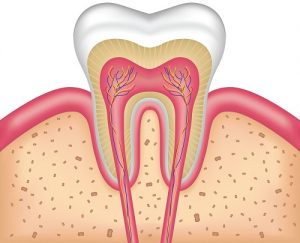Tooth Sensitivity After Filling: Why this Happens and How to Ease the Pain
- Tooth Sensitivity After Filling is Common
- Dealing with Sensitivity in the Short-Term is Easy
Tooth Sensitivity After Filling: Why this Happens and How to Ease the Pain
Tooth sensitivity is a common problem and isn’t always a result of tooth decay or a damaged tooth structure. As a matter of fact, most people experience tooth pain and sensitive teeth occasionally in life, even if they ensure perfect oral hygiene and visit the dentist regularly. The nerves in our body sometimes have a mind of their own and, just as you can’t predict when you might get an itch, you can’t be sure when a cold beverage or a misjudged bite might hit a tooth the wrong way and we end up with a sensitive tooth.
Very occasional tooth sensitivity is not a reason to worry.
However, if you’re dealing with chronic sensitivity or you notice a tooth is sensitive that has a filling, you might be dealing with a problem. Teeth can develop sensitivity after being filled and the sensitivity can be severe enough to cross over into pain. The good news is there are things you can do to ease the issue and return to eating and drinking comfortably.
Why Do Teeth become Sensitive after Fillings?
During the process of treating a tooth that needs a filling or root canal treatment, your dentist will give you anesthesia. This means you won’t feel any of the intrusive cleaning that goes on during the process of preparing the tooth for the filling. Unfortunately, anesthesia wears off. In some cases, the problem will be gone. But, in other cases, especially when the cavity is large and deep, there’s a good chance you’ll experience sensitivity after the filling.
Some of the most common reasons a tooth becomes sensitive after it is filled include:
- The filling is high
- It’s a large metal filling, which allows the heat to be conducted away from the nerve of the tooth.
- It’s a large white filling placed so quickly it stressed the surrounding area of the tooth
“A side effect of treating of tooth decay with instruments involves aggravating the nerve of the tooth in order to remove the diseased tissue – much like when you have a surgical procedure performed in the hospital.
During the procedure nerves are stimulated and may take a while to calm down, depending upon how near the decay was in relation to the nerves in the center of the tooth. Some post-op sensitivity is normal. But tooth sensitivity that does not diminish over time or gets worse needs to be addressed by your dentist.”
How You Can Deal with Tooth Sensitivity after a Filling
Unfortunately, you might not be able to do anything. If the filling is new and you’re experiencing sensitivity, you’ll just need to wait it out. The dental pulp left behind will eventually blend with the filling and the sensitivity will ease. It can take up to several weeks for this to happen, so in the meantime, take note of what triggers the sensitivity and avoid those foods and beverages.
If the sensitivity continues beyond a few weeks and you’re concerned, or the problem gets worse instead of getting better over time, you’ll need to talk to your dentist. It could be that there’s a problem with the filling and the dentist will need to make a repair.
If you’re still experiencing issues with sensitivity and your dentist has assured you that everything is fine, there are a few things you can do to ease the problem. It could be that you just have naturally sensitivity teeth and the filling aggravated the issue.
You can ease tooth sensitivity by:
Avoid brushing too hard
As good as it is to make sure your teeth are kept nice and clean, you don’t want to over brush. Brushing with a heavy hand can damage your teeth and your gums. If you notice you’re going at brushing a little too fervently, reduce the pressure and see if it helps. Switch to a circular brushing motion at the gum line (instead of side to side) or consider investing in a spin brush that allows you to simply hold the brush in place and the automated brush motion does the work.
If you notice you experience sensitivity when eating or drinking certain foods, you can avoid those foods to prevent discomfort. If you’re not sure which foods trigger the sensitivity, pay attention to how you feel when you:
- Drink hot or cold beverages
- Eat sticky candy
- Drink soda or other high-sugar beverages
- Eat a lot of high-carb sugary foods
Some people find that dairy, fruit, and vegetables tend to ease their sensitivity and overall improve dental and whole body health. Healthy changes might be just what you need to deal with a number of your health issues, including tooth sensitivity!
Sensitivity might also be caused by clenching or grinding your teeth. If you clench your teeth while awake, focus on breaking the habit. This can also ease jaw pain. If you suspect you might be clenching or grinding in your sleep, speak to your dentist about getting a custom mouth guard that will prevent the habit while you sleep.
Whitening or bleaching agents tend to make teeth more sensitive. If you’re dealing with discomfort after a filling or in general, take a break from teeth whitening. You might also try toothpaste that doesn’t make whitening claims. And if you really want to make sure your toothpaste isn’t causing the problem, consider using toothpaste that advertises itself as being for sensitive teeth.
A problem that can lead to sensitivity that you really can’t control is your age. If you’re over 40, you have a higher risk for sensitivity caused by receding gums. Natural wear and tear can cause your gums to pull back from your teeth, but you can slow the process by observing good dental hygiene habits. It’s also possible your gums are receding because of gum disease and you’ll need to have that treated. The problem can lead to issues much worse than tooth sensitivity and in some cases, you might need to undergo a scaling procedure or have a gum graft or gum surgery.
If sensitivity persists, you’ll want to see your dentist to determine if you have a cracked tooth or filling. Damage to the tooth or filling can cause you to react poorly when you introduce hot or cold beverages into your mouth.
In addition to using toothpaste made for sensitive teeth, you might also benefit from using a fluoride gel, sealants, or a better filling that covers any exposed roots. There are several options and sometimes it requires a combination of more than one treatment to achieve the results you want. Sensitivity might not seem like a big deal but, over time, the discomfort can drive you mad. And if it’s an indication of a serious problem, it can lead to further complications with your dental health.
Relate Posts to Read:
What Causes Sudden Tooth Sensitivity?
Medically Fact-Checked & Written by Our Dental Editorial Team
You can read more about our editorial guidelines by clicking this link and learn more about the Emergency Dentists USA editorial team here.












